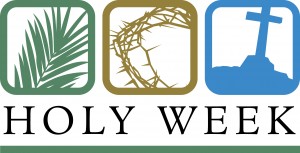Holy Week refers to the week leading up to Easter. It is the week in which the events surrounding the crucifixion and resurrection of Jesus took place. As such, it is a very important week in which Christians take time to reflect on the passion of Jesus and all the world-altering events that occurred around it. The traditional ordering of the days of this week are alluded to in a late 4th century letter entitled “Pilgrimage of Egeria,” in which a lady, writing back home to a group of her friends, describes what she saw in Jerusalem during Holy Week. This means that by the late 300’s AD the basic ordering and observance of this week was already well established, making it a very old tradition indeed.
Some Baptist Christians may object to Holy Week as “something we don’t do.” What they usually mean, when pressed, is that Baptists have not always observed the language and traditions of this week. To which I say, “Fine and good. Call the week whatever you want…just so long as we gather to remember the most important week in the history of the world!” Indeed, the language and customs surrounding Holy Week are not the point: the events of the week are, and Baptists have always seen the importance of these salvific events.
Some occasionally object to the traditional delineation of the days, arguing about the specifics of chronology or exact timing for this or that event (was the crucifixion actually on Friday, etc.). Fair enough, but the traditional structures of Holy Week are less about technical precision on debated questions of chronology and timing than about observing the events themselves that indisputably happened during the week leading up to the resurrection.
Our church observes this week, beginning with Palm Sunday (March 24) and continuing with services everyday except Saturday, the day before Easter. We will be having lunch-time prayer services on Monday and Tuesday of that week, then services Wednesday, Thursday, and Friday nights. On Thursday, we will observe the Lord’s Supper. On Friday, we will join together to reflect on the crucifixion of Jesus in a modified Tenebrae service. Then, on Easter Sunday morning, March 31, we will join for a Sunrise Service at 7:30, followed by breakfast at 8, Sunday School at 9, and morning worship at 10:15. We will not having evening services on Easter Sunday morning.
Consider setting aside this week.
There is a reason we call it “Holy”.


Pingback: What Happened During Holy Week? | First Baptist Church of Durham
Nowhere in the Scripture is this week, or these man made observances commanded or practiced by early Christians. Consider the sources of the liturgical calendar & holidays. Holy week is not holy. The church calendar isn’t Biblical and is, therefore, an untruth.
Generally, I think, Baptist’s could benefit from different perspectives on such traditions. I applaud Wyman for his attempt of recognizing how important this week was to the history of the world. Holy week by the catholic (little “c” intended) church is designed to celebrate and remind us of the journey Jesus traveled in the days immediately before His crusifixion. We would do well to remember, recount, and celebrate the sacrifice He knew was coming His way. The details of which are pretty clearly spelled out and detailed in the four Gospels and supported by other canonical writings such as Paul’s, Peter’s, James’ and others. The Bible is a book, and it is intended to be read. Unless we do that, we will not even begin to understand the grace that has been extended by His life, His death, and most especially His resurrection.
Thank you for your comment, Patrick.
Holy week and it’s the practice of observing it originated with Rome and carried over to the Reformers. It is even observed by liberal Protestant denominations.
The early church was told to remember the death of Christ at the Lord’s Supper.
As a true believer in Christ should not his death, burial and resurrection be ever
present in our hearts?
Thank you for this, Ray. God bless you.